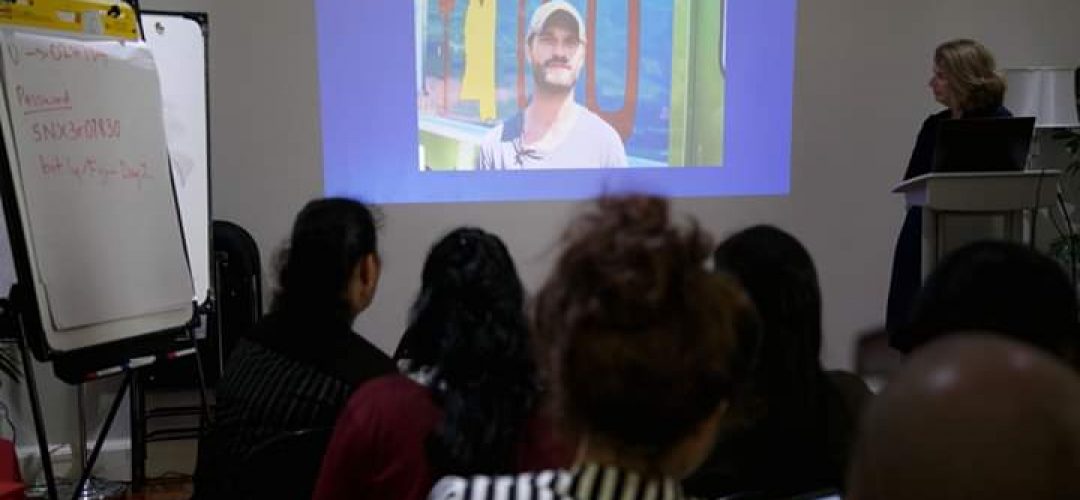Call for Pacific journos to adapt to change

Prof Wenger, right, during a recent workshop on New Media and Multimedia Reporting with regional journalists in Suva. Picture: SUPPLIED/US EMBASSY SUVA
By GERALDINE PANAPASA
JOURNALISTS and the news media industry as a whole must adapt continuously to critical developments in the marketplace in order to survive and thrive in the digital age, with Fiji and the Pacific being no exceptions, says US academic Professor Debora Wenger.
In her recent seminar at The University of the South Pacific Laucala Campus, Suva, titled ‘Quality journalism in a digital world’, the veteran journalist said multimedia skills and innovation were crucial for meeting the challenges of a rapidly-changing media landscape.
She said digitalisation had changed how news was gathered and distributed, transformed the role of the audience, and distorted the media marketplace.
“Evolve or die is a popular expression in the business world and I believe it applies beautifully to journalism and the media,” said Prof Wenger, who is a digital tools trainer, multimedia practitioner and educator at the University of Mississippi.

“The good news is, I believe, we can do it. I believe good journalism is essential for a healthy citizenry, for healthy communities and healthy countries, and I believe our audiences agree.”
The seminar was jointly organised by US Embassy in Suva and the USP Journalism Programme.
Prof Wenger, who also conducted a digital media workshop for local journalists said the major purpose of journalism was to give people the key information they needed to live their lives and essentially to support democracy.
“Journalists are not supposed to give you information and say this is what you should believe. Journalists should give you information and letting you decide, based on the facts, what you believe,” she said.
In response to a question on investigative journalism in a restricted media environment such as Fiji, Prof Wenger recommended starting small.
“You don’t have to create an investigative unit and pull half of your staff off daily news coverage for months to begin. Instead, identify one important and relevant story and dedicate the resources you can to it. Then find another and another – newsrooms need to recognise that doing just some of this work is better than doing none,” she said.
Prof Wenger also highlighted the importance of training for Pacific journalists, such as through the investigative Reporters and Editors (IRE) organization, which offers a wealth of free resources to get newsrooms started.

Journalism organisations and non-governmental organisations in the region may be able to help fund additional training opportunities, she said.
In his contribution, USP Journalism Programme coordinator Dr Shailendra Singh said a major drawback with investigative journalism in Fiji and the region was the lack of newsroom capacity in terms experience and qualifications, due to the high turnover of editorial staff.
“The media industry’s inability to pay competitive salaries means that they are constantly losing staff to the private sector, civil society organisations and government departments. A good number of Pacific newsrooms are in a constant state of flux and they struggle to build newsroom capacity,” he said.
Dr Singh, who has conducted investigative journalism training workshops with the United Nations Development Programme in the Solomon Islands, said in the Pacific, the basics of journalism was a more immediate concern due to the legal risks associated with an inexperienced and underqualified journalist corp.
“Without training, the younger and more inexperienced journalists are prone to breaching ethical and legal protocols, which makes them and their companies vulnerable to litigation, especially in Fiji, with its punitive media laws,” he said.
Dr Singh said in the digital media age, it is said that anyone can be a journalist, but it was not that simple.
“The so-called citizen journalists were not bound by professional norms, and some of the excesses on social media, masquerading as citizen journalism, were causing irreparable harm, with governments resorting to harsher legislation to contain the damage,” he said.
Despite the constraints in the Pacific media landscape, Dr Singh said investigative journalism was possible as long as journalists had good grasp of the country’s laws and worked within these parameters as much as possible, while upholding professional norms, since any breaches made journalists vulnerable to attacks.

Dr Singh gave some examples of outstanding investigative journalism in Fiji, such as the National Bank of Fiji loans scandal in the 1990s and Fiji’s first political sex scandal between the then prime minister and a female journalist, both exposed by The Review magazine in the 1990s.

Dr Singh, a former editor at The Review, which has since closed, said it took a lot of courage to report these incidents due to cultural taboos and the heated ethnic and political climate.
He added investigation journalism was not only about government and corruption. A host of other areas also warranted investigation.
He said an example was the USP Journalism student training newspaper, Wansolwara’s recent piece on the fire safety risk on Fiji’s public buses. Magazines like Mai Life and Republican had also engaged in investigative journalism.
- Geraldine Panapasa is the supervising editor-in-chief of Wansolwara. She is also a teaching assistant at USP’s Laucala campus.










